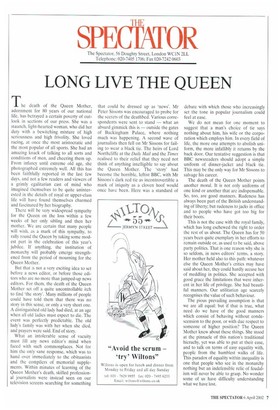LONG LIVE THE QUEEN
The death of the Queen Mother, adornment for 80 years of our national life, has betrayed a certain poverty of outlook in sections of our press. She was a staunch, light-hearted woman, who did her duty with a bewitching mixture of high seriousness and high frivolity. She loved racing, at once the most aristocratic and the most popular of all sports. She had an amazing knack of talking to all sorts and conditions of men, and cheering them up. From infancy until extreme old age, she photographed extremely well. All this has been faithfully reported in the last few days, and not a few readers and viewers of a grimly egalitarian cast of mind who imagined themselves to be quite uninterested in the details of royal or upper-class life will have found themselves charmed and fascinated by her biography.
There will be very widespread sympathy for the Queen on the loss within a few weeks of her only sibling and then her mother. We are certain that many people will wish, as a mark of this sympathy, to rally round the Queen by taking some modest part in the celebration of this year's jubilee. If anything, the institution of monarchy will probably emerge strengthened from the period of mourning for the Queen Mother.
But that is not a very exciting idea to set before a news editor, or before those editors who are no more than jumped-up news editors. For them, the death of the Queen Mother set off a quite uncontrollable itch to find 'the story'. Many millions of people could have told them that there was no story in this sense, or only a very short one. A distinguished old lady had died, at an age when all old ladies must expect to die. The event was perfectly predictable. The old lady's family was with her when she died, and prayers were said. End of story.
What an intolerable sense of vacuity must fill any news editor's mind when faced with such commonplaces. Not for him the only sane response, which was to hand over immediately to the obituarists and the compilers of memorial supplements. Within minutes of learning of the Queen Mother's death, skilled professional journalists were instead seen on our television screens searching for something that could be dressed up as 'news'. Mr Peter Sissons was encouraged to probe for the secrets of the deathbed. Various correspondents were sent to stand — what an absurd gimmick this is — outside the gates of Buckingham Palace, where nothing much was happening. A second wave of journalists then fell on Mr Sissons for failing to wear a black tie. The heirs of Lord Northcliffe at the Daily Mail and the Times realised to their relief that they need not think of anything intelligible to say about the Queen Mother. The 'story' had become the horrible, leftist BBC, with Mr Sissons's dark red tie as incontrovertible a mark of iniquity as a cloven hoof would once have been. Here was a standard of debate with which those who increasingly set the tone in popular journalism could feel at ease.
We do not mean for one moment to suggest that a man's choice of tie says nothing about him, his wife or the corporation which employs him. In every field of life, the more one attempts to abolish uniform, the more infallibly it returns by the back door. Our tentative suggestion is that BBC newsreaders should adopt a simple uniform of dinner-jacket and black tie. This may be the only way for Mr Sissons to salvage his career.
The death of the Queen Mother points another moral. It is not only uniforms of one kind or another that are indispensable. So, too, are good manners. Rudeness has always been part of the British understanding of liberty; but rudeness to jacks in office and to people who have got too big for their boots.
This is not the case with the royal family, which has long eschewed the right to order the rest of us about. The Queen has for 50 years been quite exemplary in her efforts to remain outside or, as used to be said, above party politics. That is one reason why she is so seldom, in news editors' terms, a story. Her mother held also to this path: whatever else the Queen Mother's critics may have said about her, they could hardly accuse her of meddling in politics. She accepted with good grace the limitations that were inherent in her life of privilege. She had beautiful manners. Our utilitarian age scarcely recognises the value of such behaviour.
The pious prevailing assumption is that we are all equal: but if that is true, what need do we have of the good manners which consist of behaving without condescension to the poor, or with due respect to someone of higher position? The Queen Mother knew about these things. She stood at the pinnacle of this nation's traditional hierachy, yet was able to put at their ease, and to talk on terms of easy equality with, people from the humblest walks of life. This paradox of equality within inequality is one that people who see in the monarchy nothing but an indefensible relic of feudalism will never be able to grasp. No wonder some of us have difficulty understanding what we have lost.






























































 Previous page
Previous page